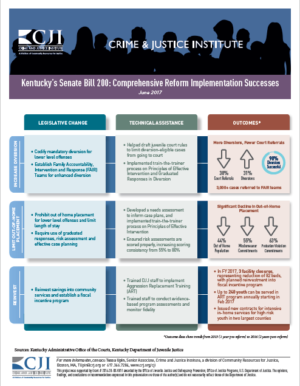
Faced with poor outcomes for youth and high costs in their juvenile justice systems, seven states are pursuing bold, comprehensive reforms aimed at better serving young people and their communities.
Since 2014, the Crime and Justice Institute, with assistance from the U.S. Department of Justice’s Office of Juvenile Justice and Delinquency Prevention (OJJDP), has provided technical assistance to each of those states – Georgia, Hawaii, Kentucky, South Dakota, West Virginia, Kansas, and Utah — to implement legislative reforms as part of OJJDP’s Smart on Juvenile Justice: A Comprehensive Strategy to Juvenile Justice Reform Initiative.
While each state presented unique challenges, the goals of reform implementation have been the same: to increase their capacity to sustain reforms; implement objective decision-making tools; enhance community-based alternatives to out-of-home placement; and support performance measurement, oversight, and reinvestment.
Georgia, Hawaii, and Kentucky were the first states OJJDP selected for assistance in 2014, followed by South Dakota and West Virginia in 2015, and Kansas in 2016. All six of those states have made strides in reforming their juvenile justice systems to better serve young people while improving safety and reducing overall costs.
Utah began implementing reforms in May of 2017 and is already making marked progress.
The following infographics provide a snapshot of reforms in the six states that began implementation between 2014 and 2016 and the positive outcomes they’ve achieved:
Click here for more information about comprehensive juvenile justice reform.
Click here to read our report “Getting ‘Smart’ On Juvenile Justice: Implementing Statewide Reforms” for a general overview of CJI’s work in these six states.